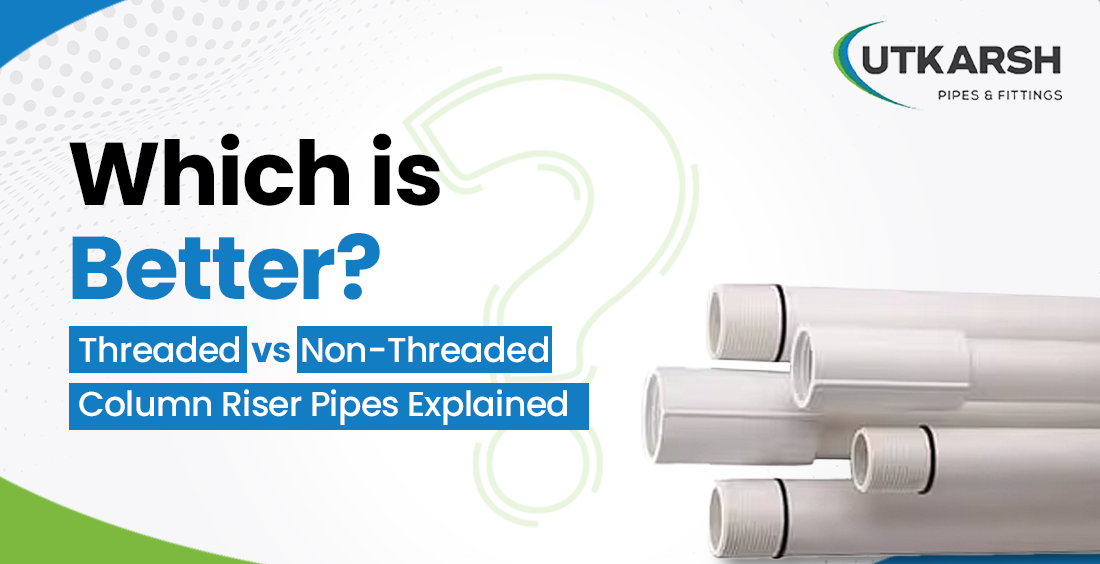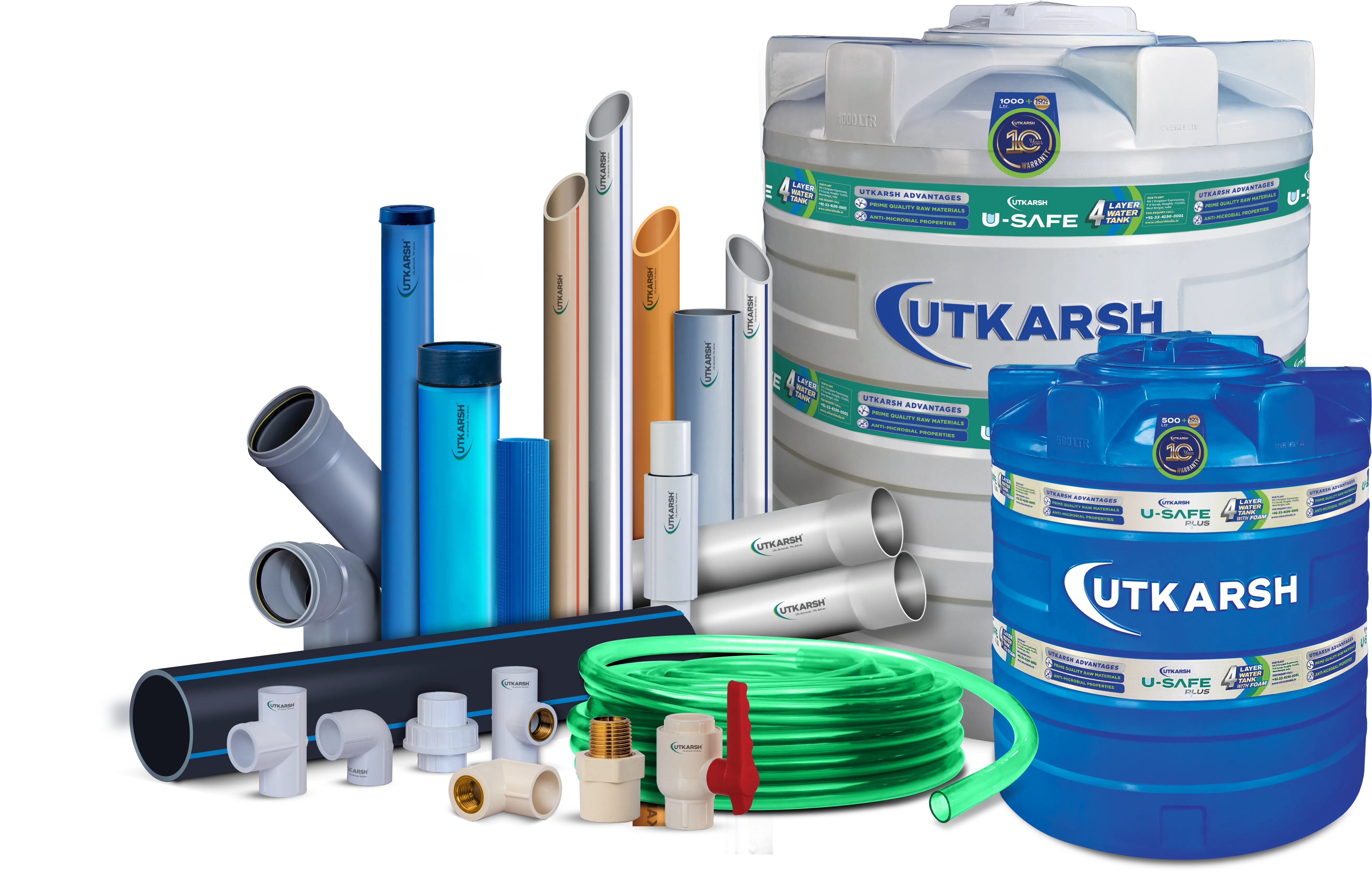Which is Better? Threaded vs. Non-Threaded Column Riser Pipes Explained

Water does not magically appear at your tap. It requires an entire system to transport water from deep underground to your home, farm or factory. The foundation of this system are Column Riser Pipes, the feel that is often neglected to mention, which carry water through Borewells to the surface using pumps. But there’s a big question that many face while pondering this concept: Should you go with Threaded Column Riser Pipes or go with non threaded options?
This is not simply a choice of procedure, it relates to how smooth your water flow will be, how much repairs you will be needing, and your overall expenditure of maintenance. Your selection doesn’t need to be too complicated either, as the type of riser pipe you choose can help save you from a lot headaches down the line, from simple water usage to powering an entire agricultural field.
Let’s break down both options and help you figure out which one’s the right fit for you!
What Are Column Riser Pipes?
Moving on from our main subject of discussion, Column Riser Pipes are relatively simple to define. These pipes connect a submersible pump in a borewell to ground level to ensure water flows through the pipe without restrictions. They possess the capability to bear the weight of the pump as well as handle the pressure of water within while also going through processes of limitless corrosion over time.
Modern systems use uPVC Column Pipes because of their strength, lack of corrosion, and low weight. The larger issue is deciding between threaded or non-threaded riser pipes. Let's examine the differences.
Threaded Column Riser Pipes: Pros & Cons
What Are Threaded Column Riser Pipes?
Threaded pipes come with screw-like ends. They are manually tightened and locked into place. The threads create a secure joint, holding each pipe segment together tightly.
Benefits of Threaded Column Riser Pipes
Strong, Secure Connection: The threaded design ensures a firm connection, reducing the chances of disconnection, especially under high pressure or vibration from the pump.
Easy to Install & Replace: Threaded pipes are simple to assemble. You don’t need special adhesives—just screw the joints tight.
Leak-Resistant: Proper threading, especially in high-quality uPVC Column Pipes, minimizes leakage risk. Additionally, sealing tapes or rings can further enhance tightness.
Perfect for Deep Borewells: Since deep borewells require strong connections, threaded Column Riser Pipes can handle greater depths and pressures without loosening.
Drawbacks of Threaded Column Riser Pipes
Thread Wear Over Time: Repeated dismantling and assembling may wear out the threads.
Alignment Issues: Incorrect tightening might misalign the pipes, leading to inefficiencies.
Non-Threaded Column Riser Pipes: Pros & Cons
What Are Non-Threaded Column Riser Pipes?
Non-threaded pipes use push-fit, clamp, or other joint mechanisms instead of screw threads. They rely on seals, rings, or clamps to stay connected.
Benefits of Non-Threaded Column Riser Pipes
Quick Assembly: These pipes offer a faster installation process—just push and lock, no threading required.
Less Risk of Thread Damage: Since there are no threads, there’s no worry about thread wear or alignment issues.
Cost-Effective for Shorter Runs: If you're working with shallow borewells or lower depths, non-threaded riser pipes are budget-friendly and efficient.
Smooth Flow: Fewer threads can sometimes mean slightly smoother water flow without minor obstructions caused by misaligned threads.
Drawbacks of Non-Threaded Column Riser Pipes
Less Secure for Deep Installations:
Non-threaded joints may not handle deep borewell pressures as well as threaded ones.More Dependent on Seal Quality:
The performance largely depends on how good the seals and rings are.
Threaded vs. Non-Threaded: How to Choose?
Here are actionable tips to help you decide:
1. Check Borewell Depth
Shallow Borewell (Up to 200 feet): Non-threaded uPVC Column Pipes work fine for lower depths where water pressure isn't extremely high.
Deep Borewell (200+ feet): Threaded Column Riser Pipes are a safer bet for high-pressure, high-load scenarios.
2. Consider Maintenance Requirements
If frequent dismantling and reinstalling is necessary (say, for pump maintenance), Non-Threaded Riser Pipes might save time.
But if you need a long-term, stable solution with minimal future adjustments, go for Threaded Column Riser Pipes.
3. Budget & Application Type
For Residential Use: Both types are viable. Non-threaded pipes are slightly cheaper upfront.
For Agricultural or Industrial Use: Threaded uPVC Column Pipes provide better durability and can handle greater usage demands.
4. Look for Quality Seals and Rings
Regardless of which type you choose, always check if the pipes come with industrial-grade rubber sealing rings. These rings absorb pump vibrations, reduce leakage, and extend the pipe’s lifespan—especially crucial for non-threaded systems.
Why Quality Matters: Utkarsh Pipes & Fittings
Choosing between threaded and non-threaded is important, but even more critical is who you’re buying from. Low-quality riser pipes—regardless of type—can lead to leaks, pump damage, and costly repairs.
This is where Utkarsh Pipes and Fittings steps in as a trusted name. As one of India’s leading manufacturers and suppliers of Column Riser Pipes, we offer a complete range tailored to various needs.
Made from superior uPVC compounds, Utkarsh’s uPVC Column Pipes feature heavy-duty sealing rings crafted from certified industrial-grade rubber. These rings effectively absorb pump vibrations, create leak-proof joints, and boost the longevity of each riser pipe.
Each pipe is manufactured using top-quality materials sourced from reputed industry leaders, ensuring that they meet—and exceed—industry standards. Whether you’re dealing with residential, agricultural, or industrial applications, Utkarsh pipes and fittings ensures smooth and superior performance every time.
Know more: 6 Things to Know About CPVC Pipes and Fittings by Utkarsh Pipes
Final Thoughts: Which Riser Pipe Is Better?
There’s no one-size-fits-all answer. Your choice boils down to:
Depth of installation
Budget
Ease of maintenance
Long-term durability
If you want the extra security and strength for deeper borewells or heavy-duty use, threaded Column Riser Pipes are your best bet. If you prefer quick installation and lower costs, non-threaded might be right.
Whichever you choose, always prioritize quality materials like those from Utkarsh Pipes & Fittings to ensure leak-proof, vibration-absorbing, and long-lasting performance.
FAQs:
What is the purpose of a pipe riser?
A pipe riser is a vertical pipe that carries fluids, usually water, from lower levels to higher levels, ensuring smooth and efficient flow.
What is the difference between a pipe and a riser?
A pipe is a general term for any hollow cylinder used to transport fluids like water, gas, or oil. It can run horizontally, vertically, or underground.
A riser, on the other hand, specifically refers to a vertical pipe that carries fluids upward, typically from a lower level to a higher level—like from a borewell to the surface. So, while all risers are pipes, not all pipes are risers.
Can riser pipes be used for industrial applications?
Yes, riser pipes are used in a variety of industries, including agriculture, municipal water supply, mining, and construction, wherever there’s a need to transport water vertically or under pressure.












